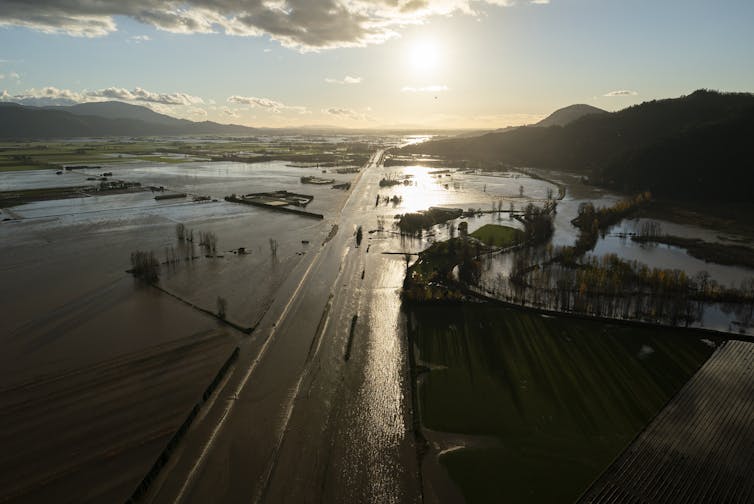With affordability, housing and health care at the top of voters’ minds in British Columbia, they haven’t heard much about climate change with less than a week to go until the provincial election.
In fact, between B.C. Conservative Leader John Rustad acknowledging that “man” is impacting the climate and the NDP’s reversal on the carbon tax, casual observers might conclude that the parties have converged on climate.
But a closer look at the platforms and policy announcements of the province’s Conservatives, New Democrats and Greens reveals fundamental differences on almost every climate-related policy.
While there is uncertainty about how much B.C.’s emissions would decline under another NDP government, they would almost certainly increase under a new Conservative one.
Climate action measures
The parties differ on the threat posed by climate change and urgency of action. The NDP and Green platforms both acknowledge the “climate crisis,” and each devotes a chapter on protecting communities from extreme weather, such as flooding, wildfires and heat domes like the one that occurred in 2021.
Read more: How an 'atmospheric river' drenched British Columbia and led to floods and mudslides
In contrast, the Conservatives claim climate change is not a crisis and that wildfires are a natural occurrence, without acknowledging how the blazes are amplified by climate change-driven heat and drought. The party favours adaptation technology over a “doom cult” perspective.
The three parties also present very different visions of B.C.’s economic future. Both the NDP and Greens emphasize the province’s comparative advantage in clean energy, and commit to skills training for the renewable energy and clean tech sectors.
In contrast, the Conservative proposal for a “free and prosperous” B.C. does not mention climate change or clean energy, while the party’s “clean energy” announcement embraces natural gas heating and oil-powered vehicles.
The Conservatives propose to scrap “any and all carbon taxes,” which suggests both the consumer and industrial carbon taxes. Although the party indicates it would do so “regardless of what happens in Ottawa,” the current federal government would respond by imposing both federal carbon taxes, as it has in other provinces.
The NDP would repeal only the consumer tax if the federal government does. The Greens would retain both taxes and remove sectoral benchmarks below which industrial polluters don’t pay the tax.
On electricity, the NDP proposes to double renewable electricity capacity by 2050 to substitute for declining consumption of fossil fuels. The party highlights BC Hydro’s recent call for clean power, which yielded proposals for triple the capacity originally sought.
The Greens similarly propose to expand rooftop solar and other renewables. The Conservatives welcome “all power sources,” including renewables, but also natural gas plants and nuclear.

Managing emissions
Transportation contributes the largest share of B.C.’s emissions at 35 per cent. The Conservatives would repeal the zero-emissions vehicle mandate and low-carbon fuel standard. The other two parties would retain those policies, and both commit to expanding electric vehicle charging networks.
Oil and gas accounts for the next largest share of B.C.’s emissions at 20 per cent. The NDP election platform commits to implement a cap on oil and gas emissions. In addition, the NDP government announced in 2023 that future liquid natural gas (LNG) approvals will be conditional on net-zero operations within the province.
The Conservative Party seeks to double LNG capacity, without mention of either an oil-and-gas cap or net-zero commitment. For their part, the Greens would reject all future LNG development, ban fracking and manage a decline of gas production.
Buildings contribute another 15 per cent of provincial emissions. The NDP government has published documents that propose provincewide adoption of a zero-emission standard for new buildings and high-efficiency heating equipment standards that would significantly reduce gas consumption in existing buildings.
The NDP and Greens both promise financial support for rooftop solar, home retrofits and heat pumps. In contrast, the Conservatives argue, without evidence, that the grid cannot support heat pumps and promise to repeal the voluntary zero-carbon building code and a “ban” on natural gas heating.
B.C. has been a climate laggard
B.C. has been slow to act on climate. That will make it very challenging to meet our 2030 emissions target.
But progress will only be made by strengthening climate policies, something both the NDP and Greens commit to do.
In contrast, the Conservatives promise to repeal current climate policies and halt development of others. But with a growing population and plans for LNG expansion, B.C.’s emissions would increase rather than decline under that strategy.
As B.C. voters prepare to cast their ballots this week, they’ve got a lot to contemplate on climate.
Kathryn Harrison receives funding from the Social Sciences and Humanities Research Council of Canada. She is chair of the mitigation advisory panel of the Canadian Climate Institute, and a member of British Columbia's Climate Solutions Council, but her comments do not represent either body nor the University of British Columbia.
This article was originally published on The Conversation. Read the original article.







